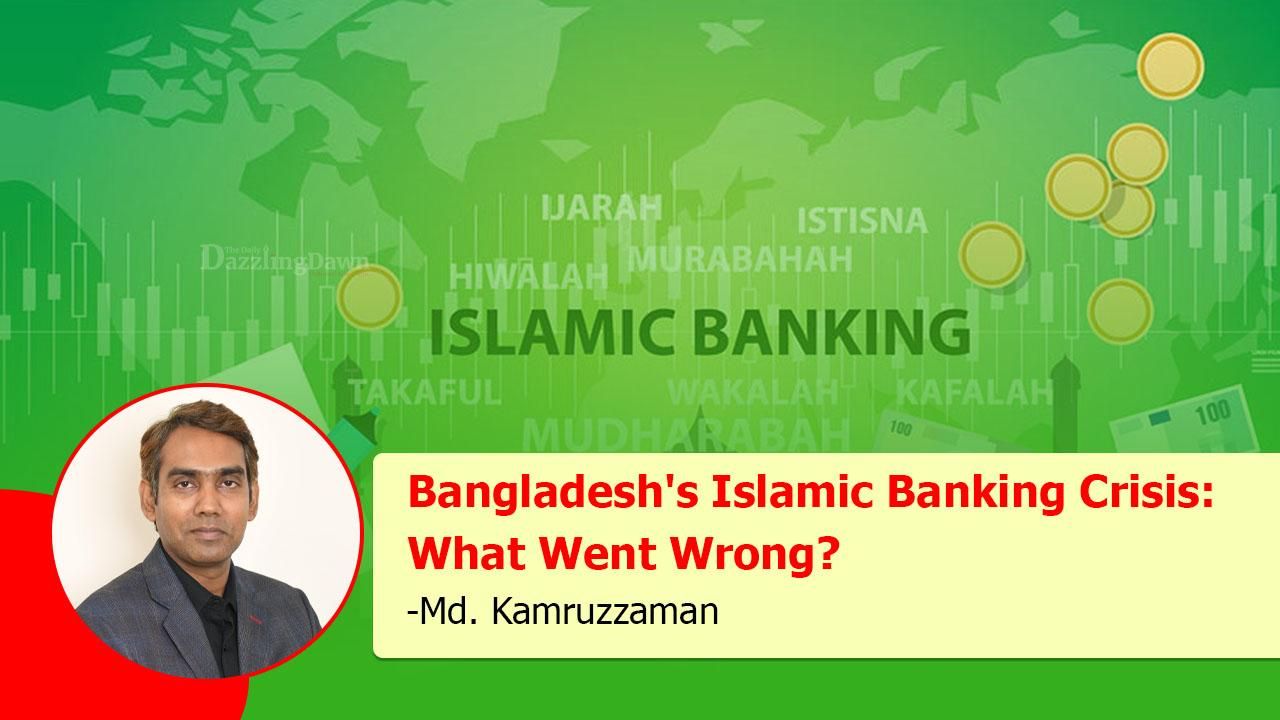Islamic banking in Bangladesh has long been considered a financial system that aligns with the religious values of the country’s Muslim majority. For decades, it gained popularity by promising interest-free and ethical banking. However, recent scandals and widespread mismanagement have exposed serious weaknesses within this system. In reality, even though Islamic banking has been branded as such, its failure to adhere to Islamic principles has turned it into a significant problem for the country’s financial sector.
A Promising Start: The Rise of Islamic Banking
Islamic banking initially found success in Bangladesh due to the large Muslim population, many of whom were attracted by the idea of banking that complied with Islamic law (Shariah). Islamic Bank Bangladesh Limited (IBBL) quickly became the largest and most trusted private bank in the country, setting an example for others. Seeing this success, conventional banks also began opening Islamic windows or Shariah branches, further expanding this model.
However, behind the scenes, things were not as they seemed. Banks were using the Islamic label as a marketing tool to attract deposits, but in practice, many failed to follow true Islamic banking principles. Mismanagement, nepotism, and unchecked authority led to a rapid decline in trust. Despite being branded as "Islamic," the system often operated without proper ethical or financial discipline.
Differences Between Conventional and Islamic Banking
At the core of Islamic banking is the prohibition of interest (riba), which sets it apart from conventional banking. In a traditional bank, depositors earn interest, while borrowers pay it. The bank’s profit or loss is not shared with the depositor.
Islamic banking, on the other hand, is based on a profit-loss-sharing model. Depositors are supposed to share in the bank’s profits if it does well and bear losses if it doesn’t. This is what makes Islamic banking appealing to some, as it is seen as a fairer system. Some key Islamic banking methods include:
- Mudaraba (Profit-sharing): The bank invests depositors’ money, and profits are shared according to an agreed ratio.
- Murabaha (Cost-plus financing): The bank buys a product and sells it to the borrower at a markup.
- Musharaka (Joint venture): Profits and losses are shared based on the investment ratios.
Despite these principles, the practical application of these models in Bangladesh’s Islamic banks has often been questionable.
Structural Weaknesses and the Collapse of Islamic Banking
IBBL, once the most prominent Islamic bank, quickly deteriorated after 2017 when the government transferred ownership to the S. Alam Group, following allegations of terrorist financing (which were never proven). The bank's subsequent downfall became evident, with revelations of major financial fraud.
S. Alam Group gradually forced senior management out, replacing them with its own people, many from the Chattogram area. Under their control, over BDT 50,000 crore (USD 5.8 billion) was siphoned off, causing a massive liquidity crisis. The bank’s total loans now stand at BDT 1.75 trillion, and the group alone reportedly withdrew BDT 88,000 crore. This misuse of public funds has taken place under the guise of Islamic principles.
Recently, the interim government has exposed the fragile state of Bangladesh's Islamic banking sector, particularly those banks controlled by politically connected groups. Islamic Bank Bangladesh, SIBL, Al-Arafah, and First Security Islami Bank are now under the Bangladesh Bank’s "red zone," signaling they are at high risk of failure.
Key Reasons Behind the Collapse
- Exploiting Religious Sentiment: Islamic banks marketed themselves as following Shariah principles, which attracted many religiously motivated depositors. However, they often neglected sound financial management, focusing more on religious branding than on mitigating risks.
- Weak Corporate Governance: Poor oversight, the absence of strong Shariah councils, and a lack of independent auditing allowed unethical practices to take root, resulting in poor decision-making and risky lending.
- Asset-Liability Imbalance: Islamic banks face unique challenges due to the prohibition on interest. They depend on profit-sharing and fee-based products, which complicates asset-liability management. Many Islamic banks in Bangladesh failed to maintain a balance between assets and liabilities, leading to liquidity shortages.
- Rising Non-Performing Loans: High levels of bad debt have further weakened these banks. Poor lending practices and inadequate loan recovery efforts have caused many loans to go unpaid, hurting the financial health of these banks.
- Regulatory Challenges: While the Bangladesh Bank has developed a regulatory framework for Islamic banking, enforcement has been inconsistent. Gaps in oversight have allowed Islamic banks to operate without adequate regulation, contributing to their instability.
Impact on the Public's Trust
The ongoing crisis in the banking sector has severely shaken public confidence, especially in Islamic banking. Customers face constant issues with basic services like cash withdrawals, fund transfers, and cheque clearing. Rebuilding this trust will be a monumental challenge.
Even though the interim government has taken steps to reform the financial sector, including the dissolution of boards in several Islamic banks, instability persists. In Islamic Bank Bangladesh alone, nearly 5,000 employees have been promoted—many under questionable circumstances.
This turmoil in the Islamic banking sector has not only damaged the reputation of these institutions but has also raised concerns about the overall stability of Bangladesh’s banking system.
The Path Forward: Urgent Need for Reform
It’s clear that relying solely on religious sentiment is not enough to sustain a banking system. For Islamic banks to regain stability, they must strengthen their governance structures, improve asset-liability management, and increase transparency. The Bangladesh Bank must also play a more active role in ensuring consistent regulation and addressing the specific needs of Islamic banking.
Currently, Islamic banking in Bangladesh is governed only by a set of guidelines issued by the central bank in 2009. There is no dedicated law to regulate Islamic banks, which makes it easier for mismanagement to occur. To safeguard the system, a robust legal framework is urgently needed.
Conclusion
Islamic banking in Bangladesh began with great promise, driven by religious values. However, its recent struggles have exposed significant structural weaknesses. For the sector to improve, a strong regulatory and legal framework must be established, along with a commitment to sound financial management. Without these changes, Islamic banking will continue to struggle, jeopardizing the public’s trust and the health of the broader banking system.
__
The writer is a seasoned TV journalist specializing in business and economic affairs.








.svg)

